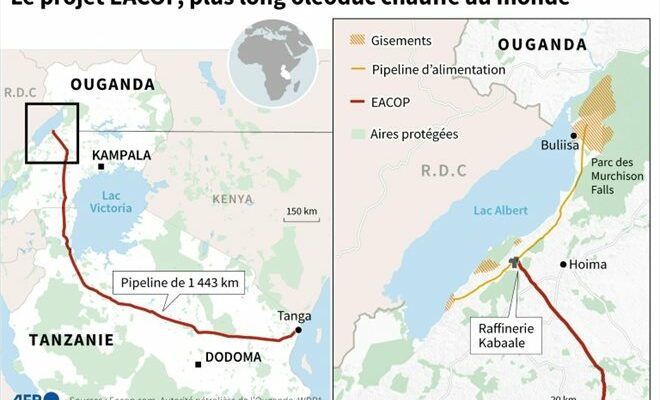The TotalEnergies group is criticized for a megaproject in Uganda and Tanzania (AFP/Archives/Lou BENOIST)
The Paris court on Tuesday dismissed opponents of the controversial TotalEnergies oil megaproject in Uganda and Tanzania, criticizing the NGOs for not having sufficiently explored the path of dialogue with the oil giant before going to court.
Highly anticipated, the decision of the magistrates constitutes a first interpretation of the “duty of vigilance” of multinationals, created in 2017 by a pioneering French law, but considered to be incomplete by the magistrates.
This law requires companies to prevent the risks that their activities pose to human rights, health and the environment. It gave rise to a dozen ongoing proceedings by NGOs against French groups, but it had never before been applied to the courts.
The Paris court, however, on Tuesday ruled “inadmissible” the requests of Friends of the Earth, Survie and four Ugandan NGOs.
These had sued the oil group in 2019 on the basis of this law by attacking two colossal inseparable sites, which they demanded the suspension: the Tilenga project, a drilling in Uganda encroaching on the Murchison Falls natural park; and the East African Crude Oil Pipeline (EACOP) project, a 1,500 km heated pipeline to the Tanzanian coast.
In addition to the danger for areas rich in biodiversity, NGOs have documented human rights violations on the ground: populations expropriated without being compensated in time or sufficiently, or even prevented from cultivating their land before having an alternative. What disputes step by step the oil group.
Target of demonstrations, petitions and multiple international protests, up to the Vatican, the megaproject has also become emblematic of the controversial choice of TotalEnergies to continue its investments in fossil fuels despite the climate crisis.
– Dialog –
But the court, which examined the case in December after three years of procedural battle, considers that the associations’ requests and grievances are now “substantially different” from those contained in the formal notice they sent to TotalEnergies in June. 2019, starting point of the case.
This formal notice, according to the law, opens a period of three months for the company to respond and, if necessary, to comply, before a possible referral to justice.

The EACOP project, the longest heated pipeline in the world (AFP/)
To justify their rejection, the magistrates defended this stage of the procedure at length, guaranteeing the will of the legislator “to institute a compulsory phase of dialogue and amicable exchange” and to guarantee a “collaborative process for developing the vigilance plan”. before any legal action.
The NGOs, which deny having substantially modified their requests, “have only clarified them and consolidated their arguments with more than 200 documents of supporting evidence”, reacted Juliette Renaud, a manager of Friends of the Earth contacted by the AFP.
They can appeal.
On the side of TotalEnergies, we are pleased that the court recognized that it had “formally established a vigilance plan” with elements “sufficiently detailed not to be regarded as summary”.
In their deliberations, the magistrates also deplore that the law, for lack of an adapted decree, only imposes “general and without precise outlines” vigilance measures, without “measuring instruments” or “control body”, among others.
“This legislation thus assigns monumental goals of protection of human rights and the environment to certain categories of company specifying at least the means which must be implemented to achieve them”, regret the judges.
Their reading will be crucial for the future of the procedures for non-compliance with the “duty of vigilance” already launched against groups such as Casino, Suez, Yves Rocher or BNP Paribas, implicated for its financial support for fossil fuels… particularly at TotalEnergies.
In another procedure, the French oil major is again assigned on the basis of the “duty of vigilance”, this time accused of underestimating the “risks of serious damage to the climate system” of its activities. A hearing is scheduled in Paris on March 22.
In the line of sight, the NGOs hope one day to obtain a French equivalent of the condemnation of Shell in 2021 in the Netherlands, when a court condemned the oil giant to accelerate its plan to reduce greenhouse gas emissions.
© 2023 AFP
Did you like this article ? Share it with your friends with the buttons below.




